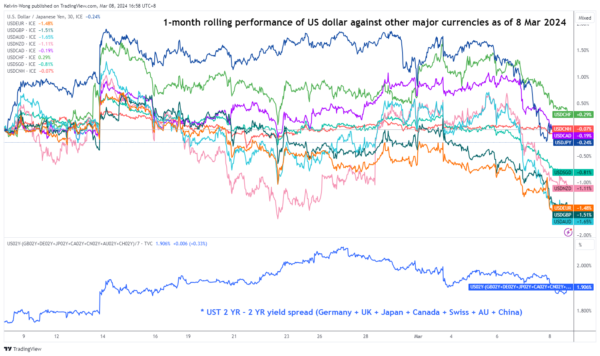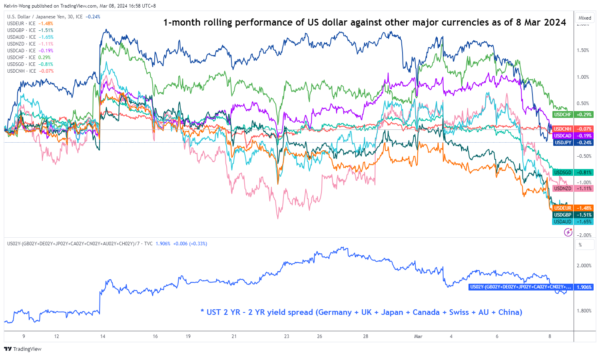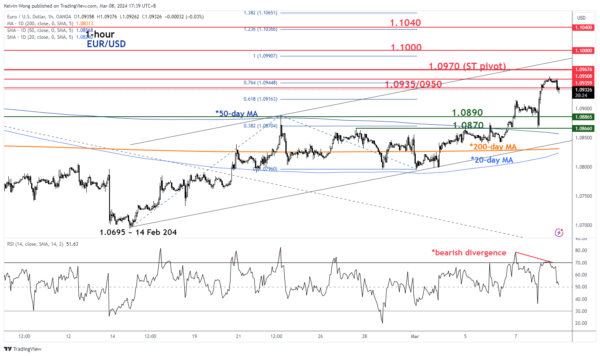- EUR/USD has evolved into a short-term uptrend phase as it traded back above its 20-day and 50-day moving averages in the past two days.
- Yesterday’s swift upmove of +89 pips ex-post ECB increases the risk of a minor mean reversion decline for the EUR/USD.
- The consensus estimate for today’s US NFP is pegged at a relatively low expectation of 200K jobs added for February below 353K added in January.
- Watch the 1.0970 key short-term resistance on the EUR/USD
In the past four days, the trend of the EUR/USD has started to take an abrupt turn from a medium-term corrective downtrend phase from the 28 December 2023 high of 1.1140 to the 4 February 2024 low of 1.0695 (a total of -442 pips/-4% decline) to evolve into a short-term uptrend phase at this juncture.
Broad-based US dollar weakness

Fig 1: 1-month rolling performances of the US dollar against major currencies as of 8 Mar 2024 (Source: TradingView, click to enlarge chart)
The US dollar has plummeted across the board as measured against the major currencies reinforced by another round of renewed weakness in both the 2-year and 10-year US Treasury yields which in turn reduces the US Treasuries yield premium over other sovereign fixed income.
Based on the current one-month rolling performance, the US dollar has plummeted to a one-month low against the EUR with a loss of -1.5% (see Fig 1) that led the EUR to share the second-best performing major currency ranking together with the GBP when measured against the US dollar.
The US 10-year Treasury yield has declined by 28 basis points in the recent two weeks from its 4.33% key major resistance and broke below a former 4.14% key near-term support which also coincided closely with the 200-day moving average. Right now, the US 10-year Treasury yield is trading at 4.07% at this time of the writing.
US NFP consensus estimate for February is set at a lower print of 200K
One key risk event to take note of today before we wrap off for this week will be the all-important US jobs number, the non-farm payrolls data (NFP) for February. In the prior two months, the US job market has been robust where both data prints (December 2023 and January 2024) have managed to beat expectations that in turn form the current bias of “no in the rush to cut interest rates mantra” among Fed Chair Powell and his colleagues in the US Federal Reserve.
The consensus estimate for today’s US NFP release is pegged at a rather low bar of 200K jobs added for February which is below 353K in January. Therefore, the actual NFP data release later may surprisingly overshoot to the upside (easily) which may spark a potential minor mean reversion rebound scenario for the US dollar.
Watch the 1.0970 key short-term resistance on the EUR/USD
Fig 2: EUR/USD short-term trend as of 8 Mar 2024 (Source: TradingView, click to enlarge chart)
Yesterday’s (7 March) burst up of +89 pips/+0.8% to print an intraday high of 1.0956 on the EUR/USD after a retest on its 50-day moving average ex-post ECB monetary policy decision has led to a bearish divergence condition seen on the hourly RSI momentum indicator at is overbought region.
These observations suggest an increased risk of a potential minor mean reversion decline for the EUR/USD at this juncture within its short-term uptrend phase where price actions have surpassed its 20-day, 50-day as well as 200-day moving averages on the upside.
If the 1.0970 short-term pivotal resistance is not surpassed to the upside, the EUR/USD may see a minor slide to expose the next near-term support zone of 1.0890/0870 (also the 50-day moving average).
However, a clearance above 1.0970 invalidates the minor mean reversion decline scenario for a continuation of the impulsive upmove sequence within its short-term uptrend phase for the next near-term resistances to come in at 1.1000 and 1.1040.










